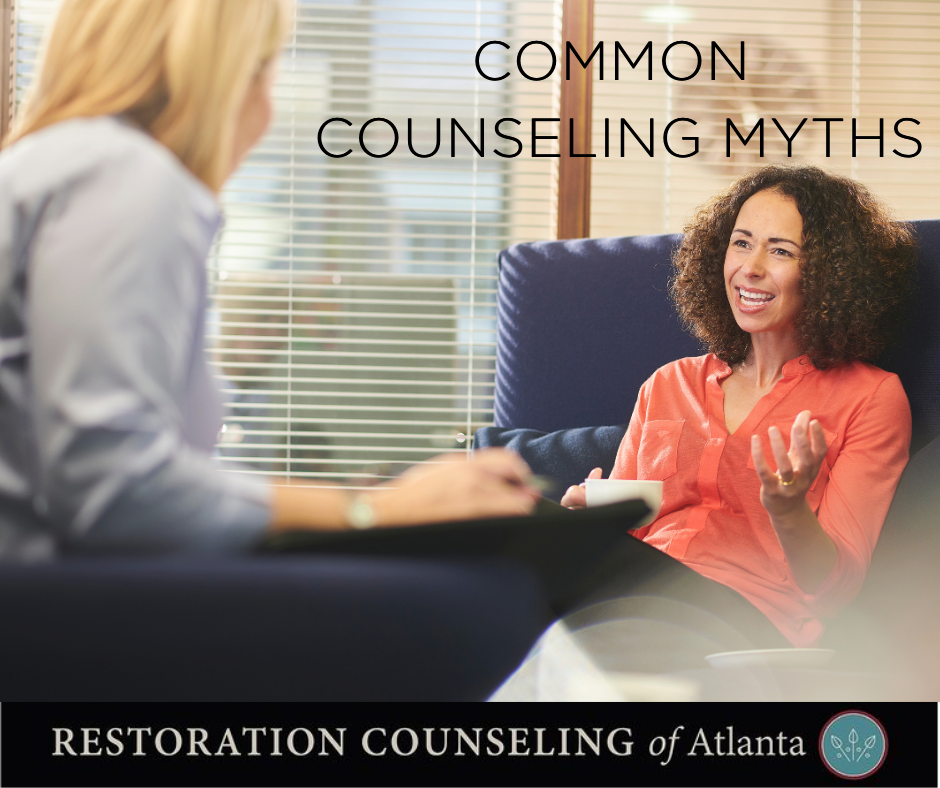Seeing a counselor has become much more normal than it was 50 years ago. However, counseling myths are still common. You probably know at least one person who has gone to see a counselor, or you yourself may have seen one. With campaigns all over social media, celebrities openly sharing their mental health struggles, and social-emotional learning becoming more common in schools, the stigma surrounding mental health struggles has significantly decreased in the past few years.
Still, counseling seems to be a bit of a mysterious process to people. It was for me as well before I began my own personal counseling years ago! It can feel scary and intimidating to go to a “stranger” and share personal experiences, thoughts, and emotions. Sometimes we are told by friends or family members what we should believe about counseling. I’ve heard quite a few myths about counseling from folks since becoming a counselor; I even believed some of these things myself before I went to counseling! I’d like to bust some common counseling myths.
Counseling Myth #1
Seeking counseling is a sign of weakness. It means that I’m flawed.
We are often taught that we should be able to stand on our own two feet. We’re also taught that we should never “air our dirty laundry.” Asking for help can be seen as a sign of weakness. Showing emotion is seen as irrational. Here’s the truth – many people seek counseling for many different reasons because we all have struggles. The beauty of counseling is that you get a third-party objective point of view to the things you are struggling with. One thing I often share in the counseling room is that asking for help is actually a sign of strength. It takes courage to seek help and invite someone into intimate parts of your story. Maybe we just need to change the story we are telling ourselves about seeking help.
Counseling Myth #2
Counselors have it all together.
Throughout grad school, my professors reminded me over and over that counseling is not about “telling,” it’s about “walking with…” It is true that counselors have the training to listen well and the tools to help you with your struggles. This does not mean that counselors have a perfect life where we always know how to handle every situation and respond well to every single person we come into contact with. Counselors are humans, too! And while I can’t speak for all counselors, I can tell you that my humanity and struggles are the very things that allow me to listen well and empathize in the counseling room. My humanity is what helps me to walk alongside my clients.
Counseling Myth #3
Counseling makes people too focused on themselves.
It is true. When you come to counseling, you will talk about yourself and you will do a lot of self-reflection. Your counselor may even ask you to do homework in between sessions that require you to focus on yourself. There may be a time period where you are focusing on yourself more than normal. Just remember that focusing on making yourself healthier will have a ripple effect in your life. Remember that counseling won’t just change your inner world, it will change how you react to your outer world. When you are healthier and more self-aware, you will find that you are able to have healthier, more loving relationships with your friends, your family, and God.
Counseling Myth #4
My problems will be fixed right away.
I often wish that I could fix problems right away – my own and my clients! In the beginning of my own counseling journey, I remember that I thought my counselor would always know the exact right things to say to solve my problems. I thought I would implement a couple of tools given to me and then be good to go! Often though, unhealthy patterns are built up over years, and they take time to undo. The human condition is complicated with many factors including biology, psychology, and relationships. There are often multiple layers, and it takes time to wade through our lives to get to the roots of our struggles. My mom has a quote on her wall that says, “A journey of a thousand miles begins with one step.” It’s okay to take it one step at a time. In fact, learning to take things one step at a time may just be part of the healing process.
Counseling Myth #5
Counselors will try to put you on medication.
There is a lot of confusion about the difference between a counselor, psychologist and psychiatrist and who does what. The most important thing I want to point out right now is that the only one of those professions that can actually prescribe medication is a psychiatrist. While counselors aren’t able to prescribe medication, they can have a conversation with you about medication if necessary. But autonomy is important to counselors. This means that we can work with you and educate you about medication. However, the decision about medication is ultimately up to you, and between you and your doctor.
If any of these myths have held you back from going to counseling, I hope I have put you at ease! I hope you feel more comfortable in seeking counseling if you need it. Please don’t hesitate to reach out to us with any questions or uncertainties about the counseling process. We are here to help.
 Written by Ashley Skinner
Written by Ashley Skinner
ashley@restorationcounselingatl.com
Ashley takes a multi-theory approach to psychotherapy. This allows her to take the whole person into account – mind, body, and soul. Her emphasis is on Cognitive-Behavioral Therapy, Narrative Therapy, and mindfulness techniques. She works with individuals ages 18 and up, dealing with anxiety and/or depression, postpartum anxiety and/or depression, trauma, abuse, life transitions, self-esteem issues, and grief.

